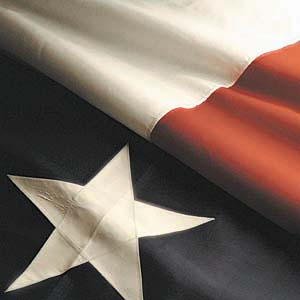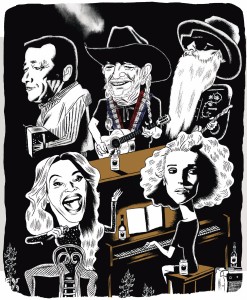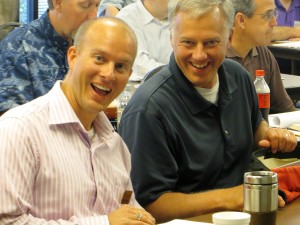 On March 2, 1836 — that’s 180 years ago today — fifty-nine courageous pioneers signed the Texas Declaration of Independence, forming forever the great Republic of Texas. I’d like to invite you to celebrate this Texas Independence Day with your favorite plate of barbecue or tacos, listen to your favorite Willie Nelson or ZZ Top album, and praise God you weren’t born in Arkansas or West Virginia or some other awful place like Oklahoma.
On March 2, 1836 — that’s 180 years ago today — fifty-nine courageous pioneers signed the Texas Declaration of Independence, forming forever the great Republic of Texas. I’d like to invite you to celebrate this Texas Independence Day with your favorite plate of barbecue or tacos, listen to your favorite Willie Nelson or ZZ Top album, and praise God you weren’t born in Arkansas or West Virginia or some other awful place like Oklahoma.
I’d also like to ask you a question: Do you know our state song? Do you know the title? Do you know the lyrics?
If you immediately answered “Texas, Our Texas,” give yourself a pat on the back. If you can sing the song with all the right words in the right order, then give yourself a standing ovation and use what’s left of your lunch hour to design and print an official-looking certificate to honor your achievement. Up until last weekend, I wouldn’t have thought that knowing and being able to sing on demand our official state song was any kind of special accomplishment for anyone born and raised in our great state. But a troubling article in the current Texas Monthly brought that assumption into serious doubt.
 Christian Wallace has written an informative and highly entertaining piece on the colorful history of our state song. His premise is a provocative one: our state song is a terrible song. No one knows it, no one remembers it, and no one ever sings it. Our state is too great to have such an awful state song. While Wallace makes a decent argument, I was most struck by his initial evidentiary proof. He claims to have conducted many informal surveys among friends and neighbors, passersby and strangers, and the overwhelming majority of them are unable to name our state song. Nobody can sing it.
Christian Wallace has written an informative and highly entertaining piece on the colorful history of our state song. His premise is a provocative one: our state song is a terrible song. No one knows it, no one remembers it, and no one ever sings it. Our state is too great to have such an awful state song. While Wallace makes a decent argument, I was most struck by his initial evidentiary proof. He claims to have conducted many informal surveys among friends and neighbors, passersby and strangers, and the overwhelming majority of them are unable to name our state song. Nobody can sing it.
I was offended by the very notion. Why, we sang it regularly in elementary school choirs and special programs and learned it again in 7th grade Texas History class. It’s our song! While driving back and forth across the Red River for a variety of reasons during my teenage years, I never failed to turn the radio down so I could belt out “Texas, Our Texas” as I crossed the border. “All hail the mighty state! So wonderful, so great!” Didn’t everybody do this?
Apparently not. I’ve conducted my own informal surveys this week with friends and co-workers, cashiers and waiters and passersby. Nobody knows our state song. A lot of people guess “Yellow Rose of Texas.” One lady argued with me about “The Eyes of Texas.” Some folks wrinkled up their faces and said, “We have a state song?” It pains me to say that Wallace is on to something.
I highly recommend his article. You can get to it by clicking here.
~~~~~~~~~~~~~~~~~~~~~~~~~~~
 Today is also my brother Keith’s birthday. He’s not 180. And I don’t think he has his own song. If he does, it might be “The Rover” from Led Zeppelin’s Physical Graffiti. If you wanted to celebrate his birthday, you might watch Naked Gun tonight, careful to skip past the scene on the ledge and to watch the balls and strikes scene at least twice.
Today is also my brother Keith’s birthday. He’s not 180. And I don’t think he has his own song. If he does, it might be “The Rover” from Led Zeppelin’s Physical Graffiti. If you wanted to celebrate his birthday, you might watch Naked Gun tonight, careful to skip past the scene on the ledge and to watch the balls and strikes scene at least twice.
Keith is an outstanding theological thinker, faithful follower of our Lord, and devoted servant of God’s Church. His article “Restorationism and Church History: Strange Bedfellows?” from the Christian Studies journal he edits is a classic work on the complicated relationship between Churches of Christ and the whole of pre-restoration church history. I highly recommend it, too. He takes head-on our Cambellite creed of “nothing not as old as the New Testament” and introduces us to the concept of “retrieval theology” that seems very helpful:
“This is not a call to re-create or ape the faith and practice of a specific time or place from the past; not every thought or practice in church history is equally good or relevant for us. It means learning from the wisdom of our ancestors and appropriating the best that it has to offer for the sake of the church today.”
You can get to it by clicking here: KeithStanglinRestorationism
Happy Birthday, Keith. I’m very proud of you and very honored to be your brother.
Peace,
Allan
Leave a Reply